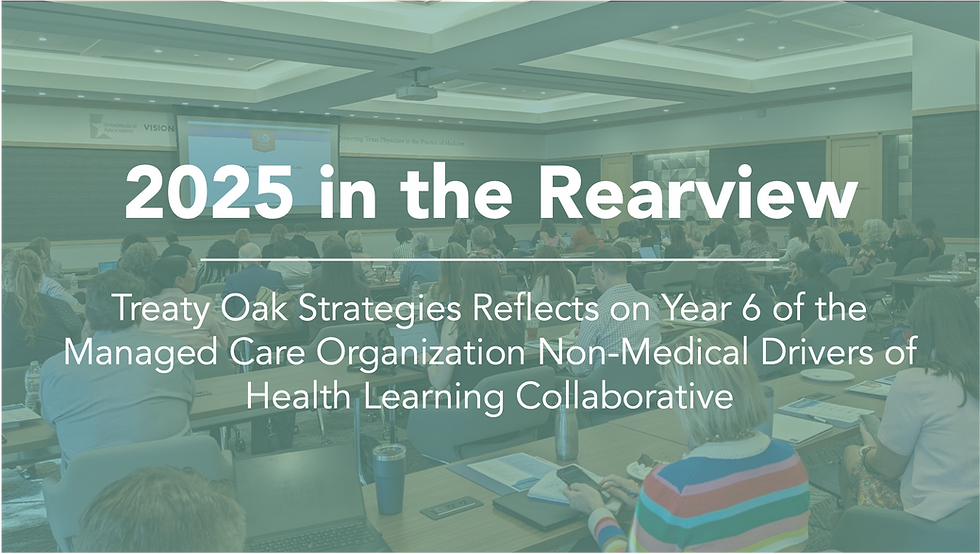New CMS Bulletin: Coverage of Services and Supports to Address Non-Medical Drivers of Health
- Treaty Oak Strategies

- Nov 27, 2023
- 4 min read
On November 14, 2023, the Centers for Medicare and Medicaid Services (CMS) issued an informational bulletin on opportunities to cover nutrition and housing related services in Medicaid and CHIP programs. In addition to the bulletin, CMS published a framework of nutrition and housing services and supports that are considered allowable under CHIP and Medicaid and the corresponding statutory authority a state can use to cover the services.
Health-related social needs (HRSN) are the unmet and adverse social conditions that contribute to an individual’s poor health outcomes. Non-medical drivers of health (NMDOH) are the conditions in the places where people live, learn, work and play that affect a wide range of health risks and outcomes. Addressing NMDOH and associated HRSNs can improve access to health care and health outcomes and result in reduced long term health care costs. State Medicaid programs have not traditionally covered housing and nutrition related services. Today, however, states are exploring coverage options, and the new CMS memo outlines opportunities states can leverage to address food and housing insecurity.
Previous Guidance
Over the past several years, CMS has issued memos and letters related to covering NMDOH interventions to address HRSNs:
January 2021 CMS State Health Official Letter Opportunities in Medicaid and CHIP to address SDOH Outlines Medicaid statutory authorities that can be leveraged to cover NMDOH interventions.
December 2022 CMS guidance Addressing HRSN in Section 1115 Demonstrations
January 2023 State Medicaid Director Letter Additional Guidance on Use of In-Lieu of Servies and Settings in Medicaid Managed Care Outlines in-lieu of service options.
Guiding Principles for Coverage
There are several principles that guide Medicaid coverage of NMDOH interventions, including:
The intervention must be evidence-based and medically appropriate for the population.
The service cannot supplant existing social services and must be complementary to existing social services.
Coverage must adhere to statutory authorities and program goals.
The services must be the choice of the enrollee and the enrollee must be able to opt out at any time.
The provision of services does not absolve the state or managed care plan of their responsibility to provide coverage for other medically necessary services.
Medicaid Allowable Housing and Nutrition Services
The new CMS framework includes a table of allowable services by HRSN domain (housing and nutrition) and by Medicaid and CHIP authority.
Medicaid and CHIP Statutory Authorities referenced in the framework include:
In-Lieu of Service 42 CFR § 438.3(e)(2) outlines managed care plans’ abilities to cover services or settings that are substitutes for existing Medicaid covered services or settings (also known as ILOS). The in-lieu of service must be medically appropriate and a cost-effective substitute.
Home and Community Based Services waivers Home and Community Based Services (HCBS) first became available in 1983 when Congress added section 1915(c) to the Social Security Act, giving States the option to receive a waiver of Medicaid rules to cover services and supports necessary for individuals to live in the community rather than an institution.
1115 Demonstration Waiver Section 1115 of the Social Security Act gives CMS the authority to approve experimental, pilot, or demonstration projects that are found to be likely to assist in promoting the objectives of the Medicaid program. The purpose of these demonstrations is to test and evaluate state-specific innovative policy approaches.
CHIP Health Services Initiative CHIP statute allows states to use up to 10% of its total CHIP spending health services initiatives (HSIs), after covering CHIP state plan administrative expenses (§ 2105(c)(2)(A) of the Act). States have substantial flexibility to determine the focus, scope, and design of these initiatives that must be focused on improving the health of eligible children.
Medicaid allowable housing and nutrition services in the framework include:
Housing/Home Environment Services:
Housing supports without room and board, including:
Housing transition and navigation services (e.g. finding and securing housing)
Pre-tenancy navigation services
One-time transition and moving costs (e.g. security deposits, application and inspection fees, utilities activation fees and payment in arrears, movers)
Tenancy and sustaining services and individualized case management
First month’s rent, as a transitional service
Short-term pre-procedure and/or post-hospitalization housing with room and board
Caregiver respite with or without room and board
Short-term post-transition housing with room and board
Utility assistance
Day habilitation programs without room and board
Sobering centers without room and board
Home remediations, including:
Air filtration, air conditioning, or ventilation improvements
Refrigeration for medications
Carpet replacement
Mold and pest removal
Housing safety inspections
Home/environmental accessibility modifications
Nutrition:
Case management services for access to food/nutrition programs, benefit program application assistance, and benefit program application fees
Nutrition counseling and instruction tailored to health risk, nutrition-sensitive health conditions, and/or demonstrated outcome improvement, including:
Guidance on selecting healthy food
Healthy meal preparation
Home delivered meals or pantry stocking tailored to health risk and eligibility criteria, certain nutrition-sensitive health conditions, and/or specifically for children or pregnant individuals, including:
Medically tailored meals to high-risk expectant individuals at risk of or diagnosed with diabetes
Nutrition prescriptions, tailored to health risk, certain nutrition-sensitive health conditions, and/or demonstrated outcome improvement, including:
Fruit and vegetable prescriptions
Protein boxes
Food pharmacies
Healthy food vouchers
Grocery provisions for high-risk individuals to avoid unnecessary acute care admission or institutionalization
For more information about work in Texas related to NMDOH see Texas MCO NMDOH Learning Collaborative, funded by the Episcopal Health Foundation and the Michael and Susan Dell Foundation and HHSC’s NMDOH Action Plan.
Contact Laurie Vanhoose - laurie@treatyoakstrategies.com for questions or additional information.




Comments